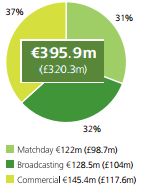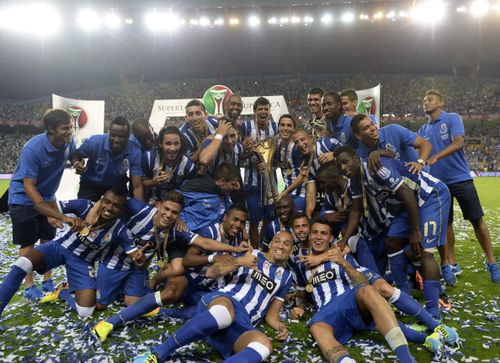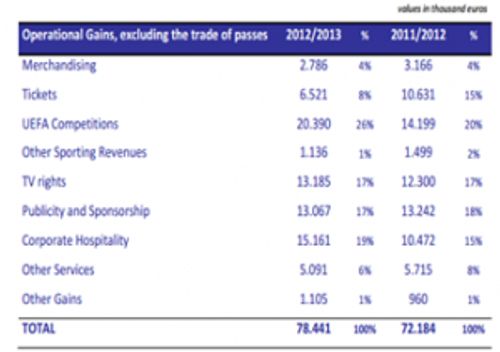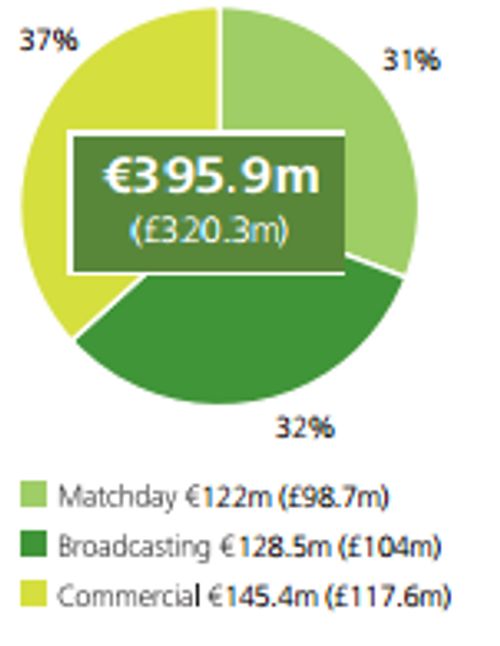
Portuguese football - Using transfer variants as a business model for success

Over a sustained period now, Portuguese clubs have built a reputation for producing top class football players and prided themselves on selling them for the healthiest of profits. It is admirable that they still remain competitive in Europe and continue to churn out those little gems on a year-to-year basis.
Make no mistake, generating a sizeable income through “transfer fees” is a mere necessity for them to be able to rub shoulders with the very best in the business. The country has been one of the worst hit by recession and revenues through conventional means in the industry remain appalling. For the sake of comparison, let’s take the example of Porto and Manchester United from the 2012/13 reports.

Porto

Manchester United
As is evident, Porto makes a fraction of the amount in relation to the three major cash cows which most elite clubs depend on – Broadcasting (TV rights), Matchday (Tickets) and Commercial deals(Merchandising/Sponsorship). Hence the need to look elsewhere – tapping external markets (alongside focusing on youth systems) has largely been the norm due to ease of immigration laws, lack of language barrier and, to an extent, superagent Jorge Mendes. It is interesting to analyze the variations in the transfer business models adopted by each of the top 4 clubs in Portugal over the past couple of seasons.
Porto – Foreign imports
Porto’s famed scouting network is easily the most successful in modern age football. Director General of Football, Antero Henrique says: “We work with 250 scouts around the world in countries that make sense for football because we will not send anyone to Bangladesh. We have internal and external scouts, who are divided into several levels of observation, which allows a player to be viewed by several people. They work with a shadow team, which is a set of players who are identified from various leagues and capable of being hired by Porto.”
The policy has reaped rich rewards with reports that a €400m profit (£342m) has been made since 2004 from the sales of key assets including Radamel Falcao, Hulk, James Rodríguez and João Moutinho. The likes of Jackson Martinez, Eliaquim Mangala and Fernando will be the next to follow for hefty pricetags with the onus now on further development of Alex Sandro, Danilo, Herrera and Reyes so as to maximize their potential and subsequent transfer value. All this whilst the scouts behind the scenes work out the next set of talents worthy of a ride on the club’s conveyer belt.
Benfica – Foreign imports and Refining discards
Coach Jorge Jesus has been at the helm of affairs since 2009 and whilst his tenure has had its ups and downs, not even his most vocal critic can argue against his work of turning the likes of Javi García (ex-Real Madrid), Nemanja Mati? (ex- Chelsea now back at Chelsea) and Ezequiel Garay (ex-Real Madrid) into world class players. The trio were deemed surplus to requirements at their previous clubs but developed prodigiously at Benfica, especially on the technical aspects of their game.
Others such as David Luiz, Ramires, Fabio Coentrao and Axel Witsel thrived in a similar environment and along with Javi García fetched transfer fees totalling €150 million (£127 million) – a profit of €130 million (£110 million) on what they cost. Mati? was the latest to follow suit with a €25 million (£21 million) return to Chelsea and Garay continues to be linked with the likes of Manchester United and Zenit.
Meanwhile, much of the focus has now shifted to the Serbian market with Filip Djuricic, Lazar Markovi?, Miralem Sulejmani and Ljubomir Fejsa snapped up, nurtured and polished to become the perfect end product.
Sporting – Youth academy
This season has brought about winds of change for Sporting as they resorted to doing what they know best – churning out quality from their youth academy. Under the leadership of the much maligned President Godinho Lopes over the last couple of years, they explored foreign markets and marginalized youngsters with disastrous results financially and competitively. It was a decision beyond reason with the academy having produced the likes of Luis Figo, Joao Moutinho, Nani, Miguel Veloso and Cristiano Ronaldo in recent memory.
Needless to say, Godinho Lopes was sent packing, and his successor Bruno de Carvalho did the sensible thing in returning to their forte. The ambitious Leonardo Jardim was brought in as coach and immediately started to deliver excellent results with some wonderful free flowing football. The backbone to the side is William Carvalho who returned from a loan spell at Cercle Brugge and was immediately tasked with the job of manning the midfield – a job he took to with confidence and performances lately have drawn comparisons with the legendary Patrick Vieira.
Lots of credit also has to go to midfield compatriots Adrien Silva and Andre Martins, both of whom could follow William Carvalho (and goalkeeper Rui Patrício) to greener pastures with a rich return to the club coffers. There are others waiting in the wings with much promise such as defender Eric Dier (England U-21 international) and winger Carlos Mané, hoping to follow in the footsteps of their illustrious academy graduates.
Braga – Using lower clubs as “feeders”
Braga have established themselves as a force to reckon with in recent years, regularly representing the country in European football and consistently challenging for domestic honours . This particular season, things have not gone to plan, but there are a lot of positive indicators in terms of player development which offers hope for the future. Generally, Braga tends to be looked at as a stepping stone for players to showcase their skills at the top level and forge a fast tracked move to bigger clubs, hence it often becomes the preferred destination over plying one’s trade in the “B” teams of the Os Três Grandes.
The club uses this lure to its advantage and scans the teams below them to pick up the cream of the crop on the free or cheap. Four of their most valuable players – Éderzito (ex- Academica), Luiz Carlos (ex- Paços de Ferreira), Rafa Silva (ex- Feirense) and Aderlan Santos (ex-Trofense) have been bound by release clauses ranging from €10-30 million, and if reports are to be believed then Monaco are preparing for a swoop on the latter duo come the summer courtesy of hitting those high numbers.
Then there’s also possible earnings should Diego Costa’s €40million transfer million transfer to Chelsea materialize (Braga own 20% and stand to make €8million which is half their annual budget!). The club’s transfer policies have often drawn the wrath of the smaller clubs who accuse them of forcing moves or having “gentlemen agreements”, but it’s all part of the game which boils down to survival of the fittest.
The lower clubs across divisions have to be given credit for conducting similar operations, albeit on a smaller scale, but ones which eventually play an important role in producing/refining talent aided by some fine coaching. On a note of caution, there will be times when the resources dry up and/or sporting success will be compromised but if the clubs continue to play smart then one can expect a thorough replenishment on all fronts as they use “transfers” as a soundboard to success.